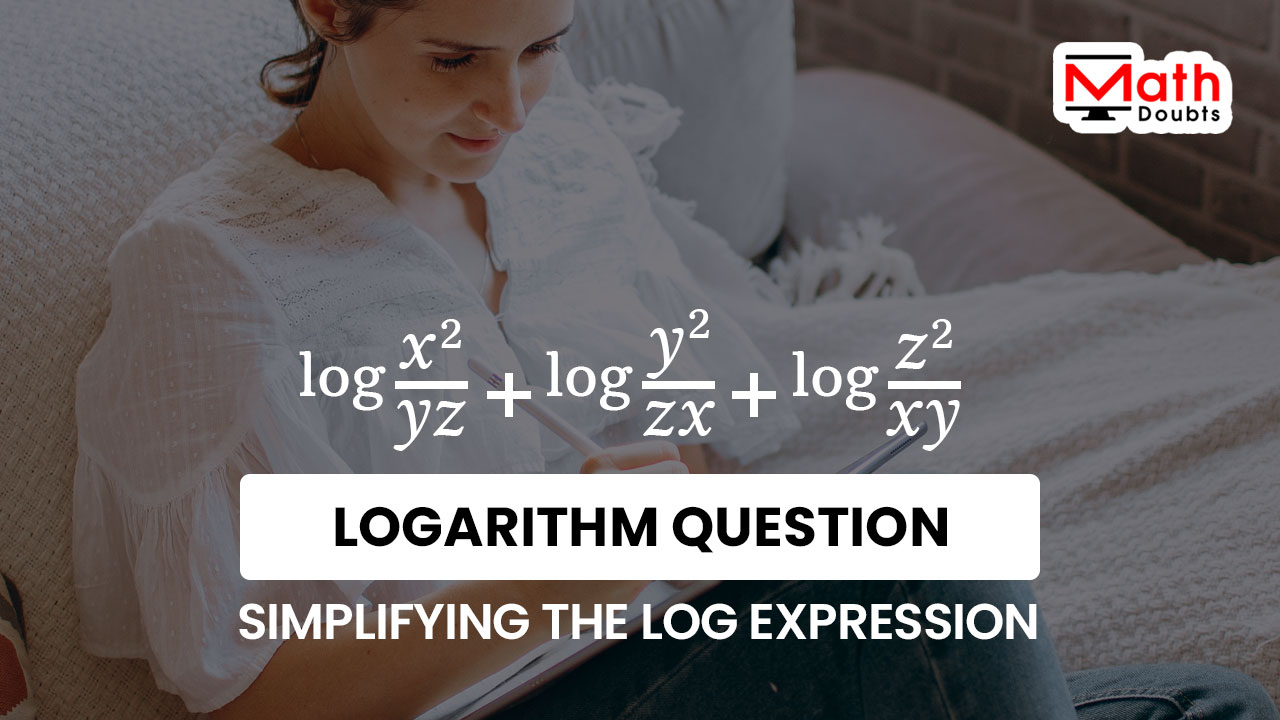
The common logarithm of $x$ square divided by the product of $y$ and $z$, plus the common logarithm of the quotient of $y$ square divided by $z$ times $x$, plus common logarithm of square of $z$ divided by the product of $x$ and $y$ is the given logarithmic expression in algebraic form and it should be evaluated by simplifying it in this logarithmic question.
The quantities in the common logarithm are in rational form in all three terms. The logarithm of a quotient can be expanded as the difference of their logarithms as per the quotient rule of the logarithms in the logarithmic expression in algebraic form.
$=\,\,$ $\log{x^2}$ $-$ $\log{(yz)}$ $+$ $\log{y^2}$ $-$ $\log{(zx)}$ $+$ $\log{z^2}$ $-$ $\log{(xy)}$
There are power functions inside the common logarithm in first, third and fifth terms of the logarithmic expression. Now, use the power rule of the logarithms to eliminate the exponents from the power functions inside the common logarithm.
$=\,\,$ $2 \times \log{x}$ $-$ $\log{(yz)}$ $+$ $2 \times \log{y}$ $-$ $\log{(zx)}$ $+$ $2 \times \log{z}$ $-$ $\log{(xy)}$
$=\,\,$ $2\log{x}$ $-$ $\log{(yz)}$ $+$ $2\log{y}$ $-$ $\log{(zx)}$ $+$ $2\log{z}$ $-$ $\log{(xy)}$
Two quantities in algebraic form are multiplying inside the logarithm in second, fourth and sixth terms of the logarithmic expression in algebraic form. The logarithm of a product of two quantities can be expanded as sum of their logs, as per the product rule of the logarithms.
$=\,\,$ $2\log{x}$ $-$ $(\log{y}$ $+$ $\log{z})$ $+$ $2\log{y}$ $-$ $(\log{z}$ $+$ $\log{x})$ $+$ $2\log{z}$ $-$ $(\log{x}$ $+$ $\log{y})$
Finally, it is time to simplify the logarithmic expression in algebraic form for finding the value of the given logarithmic expression.
$=\,\,$ $2\log{x}$ $-$ $\log{y}$ $-$ $\log{z}$ $+$ $2\log{y}$ $-$ $\log{z}$ $-$ $\log{x}$ $+$ $2\log{z}$ $-$ $\log{x}$ $-$ $\log{y}$
According to the commutative property, the places of the terms within the expression can be changed and it helps us to write the like logarithmic terms closer.
$=\,\,$ $2\log{x}$ $-$ $\log{x}$ $-$ $\log{x}$ $+$ $2\log{y}$ $-$ $\log{y}$ $-$ $\log{y}$ $+$ $2\log{z}$ $-$ $\log{z}$ $-$ $\log{z}$
The like logarithmic terms can be added by the addition rule of the like terms and it simplifies the logarithmic expression.
$=\,\,$ $2\log{x}$ $-$ $2\log{x}$ $+$ $2\log{y}$ $-$ $2\log{y}$ $+$ $2\log{z}$ $-$ $2\log{z}$
Now, let us write the like logarithmic terms as groups to simplify the logarithmic expression further.
$=\,\,$ $(2\log{x}$ $-$ $2\log{x})$ $+$ $(2\log{y}$ $-$ $2\log{y})$ $+$ $(2\log{z}$ $-$ $2\log{z})$
$=\,\,$ $(\cancel{2\log{x}}$ $-$ $\cancel{2\log{x}})$ $+$ $(\cancel{2\log{y}}$ $-$ $\cancel{2\log{y}})$ $+$ $(\cancel{2\log{z}}$ $-$ $\cancel{2\log{z}})$
$=\,\,$ $0+0+0$
$=\,\,$ $0$
A free math education service for students to learn every math concept easily, for teachers to teach mathematics understandably and for mathematicians to share their maths researching projects.
Copyright © 2012 - 2025 Math Doubts, All Rights Reserved